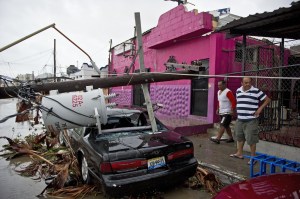The end of the Earth.

That’s how an official Mexican tourism website describes Los Cabos.
For 27-year-old Kate Pope, the popular beach travel destination on the southern tip of the Baja California peninsula felt like just that after Hurricane Odile hit Sunday night.
“The hotel gates are chained shut and there are guards with batons for security,” Pope said. “Resorts are a good target once the grocery stores are depleted.”
More than 1,000 miles away, her fiance, William Wilcox, was frantic.
Pope had traveled to Cabo San Lucas from California for a bachelorette celebration with her sisters and friends.
For days, Wilcox hadn’t heard from them — until Wednesday morning, when he learned that instead of partying at beachside bars, the group had huddled for 14 hours in a hotel basement and then later spent the night in soaked beds in a flooded room.
The hotel employees asked them to turn all flashlights off and keep quiet so they did not attract the masses roaming the streets, Pope said.
“People are still stuck,” Wilcox wrote in a Twitter post Thursday. With communication still spotty, he says he’s not sure where Pope is, but he hopes she’s on a bus on the way to the airport.
It’s a harrowing situation that’s left the resort region paralyzed long after the storm hit. Authorities said thousands of tourists were trapped after the storm left airports unable to reopen. Mexican military aircraft began transporting passengers from the region Tuesday. By Thursday, the country’s transportation ministry said 18,000 people had been flown out on more than 120 military and commercial flights.
“The great majority of stranded tourists have been evacuated,” the ministry said, adding that efforts will continue until all the affected travelers are transported.
On Thursday afternoon, an emergency message from the U.S. Embassy advised U.S. citizens in the area to go as soon as possible to the airport in San Jose del Cabo, where the State Department was working with U.S. and Mexican carriers to arrange flights.
“Passengers should be prepared to wait until they are able to depart,” the statement said.
By Thursday evening, there were still thousands of tourists trying to get out of the area. A line at the airport stretched for more than a kilometer.
Out of contact for days
But several family members of tourists vacationing in Mexico told CNN they’re still waiting to find out how their loved ones fared.
It took Elizabeth Vasquez of Concord, California, days to hear from her daughter after Odile pounded Puerto Los Cabos.
“Mom I can hear the wind now,” Lisa Vasquez wrote in a text as the storm hit. “I hear all kinds of things hitting the building.”
Not long after that message, any word from the daughter ceased.
On Thursday, Lisa Vasquez and her fiance Tomas were back in the United States at a Dallas airport trying to get a flight home to California. And they were back in touch with family.
Georgia Demet-Mangiameli says two of her sons were stranded in Cabo San Lucas after heading there for a destination wedding.
“It’s very disturbing. … In the United States, there is the Red Cross which gets people out of harm’s way instantly and there in Mexico they have just been sitting there for days since Sunday,” she said.
“The conditions are horrible. They are running out of food, water and toilet paper,” Demet-Mangiameli told CNN. “They are worried about looters.”
‘It just hit like a pile driver’
In four years of living in Cabo San Lucas, Justin Dow said he’d never seen anything like it.
“It just hit like a pile driver. It was so vicious that the house was shaking. The noises were so scary,” Dow said, describing his experience hearing the storm hit. “The entire downstairs had at least an inch or more of water. You could just hear the destruction outside.”
Now, Dow said, the town he calls home has drastically transformed.
“It is complete and utter devastation. They are looting everything,” he said. “There needs to be a lot done.”
On Thursday, Mexican President Enrique Peña Nieto said officials were creating a temporary work program to clean up damaged areas and community kitchens to help residents in the most severely impacted areas, state media reported.
But Dow, originally from St. Simons Island, Georgia, said government officials in Mexico didn’t react quickly or strongly enough to the devastating storm and its aftermath.
He and his wife managed to evacuate on Wednesday afternoon, flying to San Diego with their dogs Sofi and Partner sitting at their feet.
Dow says he can’t shake the thought of the people left behind.
“Humans become desperate, and desperation turns into bad things,” he said. “So many people are still there, so many people that can’t leave.”
















